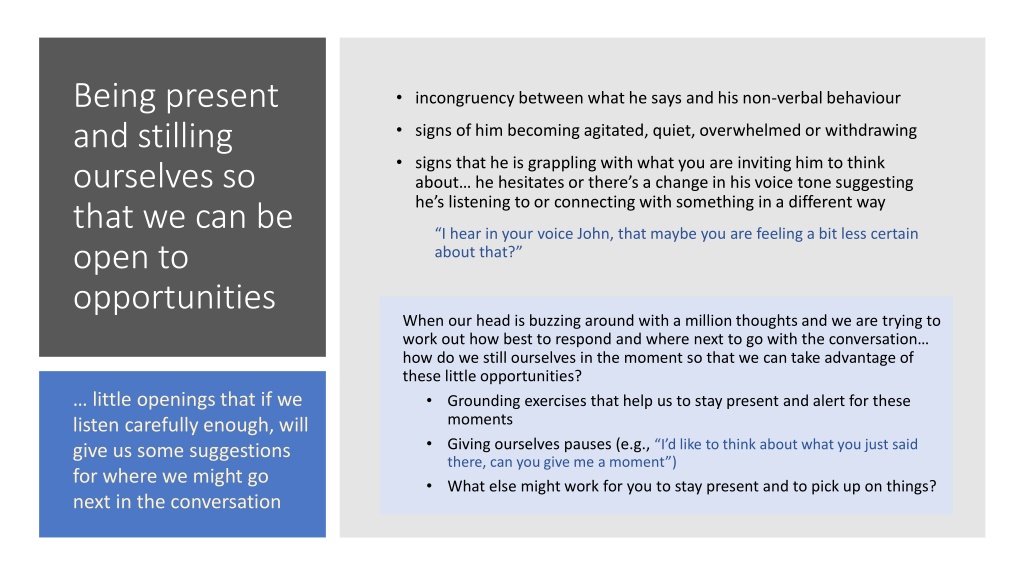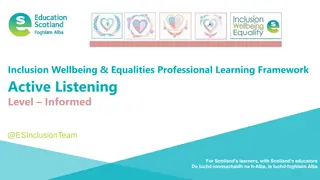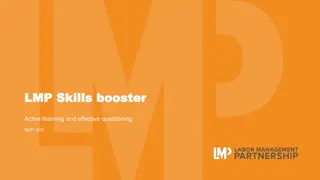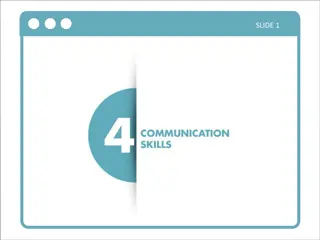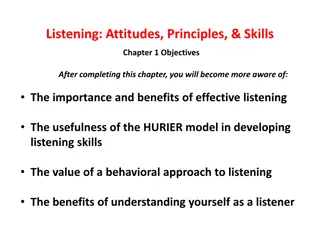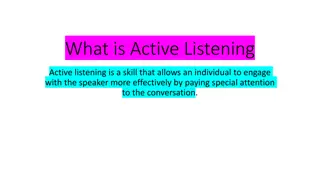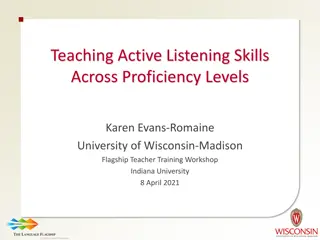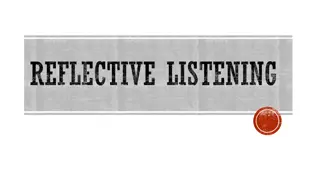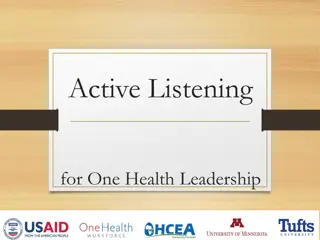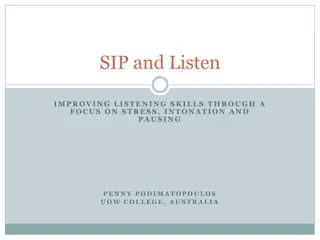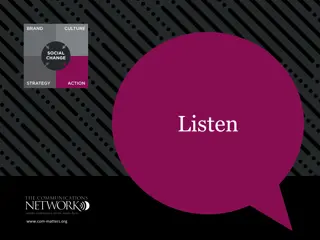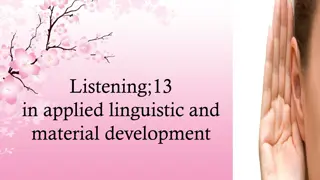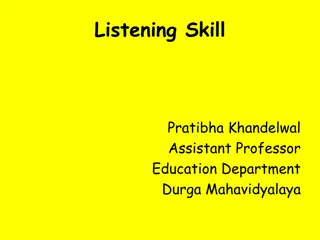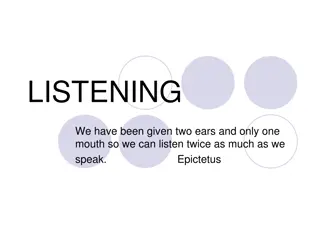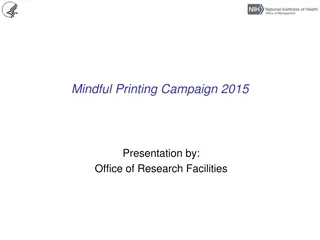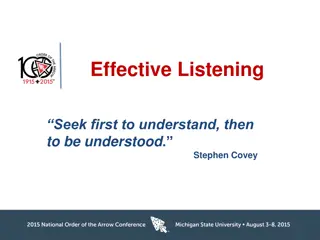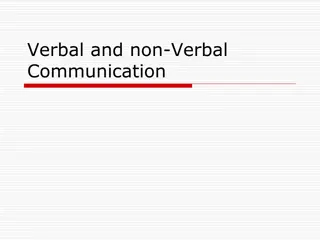Enhancing Communication Skills Through Mindful Listening
Cultivating mindfulness in conversations allows us to notice subtle cues, enabling deeper understanding and connection. By staying present and attuned to verbal and non-verbal signals, we can uncover underlying meanings and address sensitive topics effectively. Grounding exercises, pauses, and active listening techniques aid in navigating complex dialogues with empathy and insight, fostering authentic communication and building trust.
Download Presentation

Please find below an Image/Link to download the presentation.
The content on the website is provided AS IS for your information and personal use only. It may not be sold, licensed, or shared on other websites without obtaining consent from the author. Download presentation by click this link. If you encounter any issues during the download, it is possible that the publisher has removed the file from their server.
E N D
Presentation Transcript
Being present and stilling ourselves so that we can be open to opportunities incongruency between what he says and his non-verbal behaviour signs of him becoming agitated, quiet, overwhelmed or withdrawing signs that he is grappling with what you are inviting him to think about he hesitates or there s a change in his voice tone suggesting he s listening to or connecting with something in a different way I hear in your voice John, that maybe you are feeling a bit less certain about that? When our head is buzzing around with a million thoughts and we are trying to work out how best to respond and where next to go with the conversation how do we still ourselves in the moment so that we can take advantage of these little opportunities? Grounding exercises that help us to stay present and alert for these moments Giving ourselves pauses (e.g., I d like to think about what you just said there, can you give me a moment ) What else might work for you to stay present and to pick up on things? little openings that if we listen carefully enough, will give us some suggestions for where we might go next in the conversation
his observable thinking what he might not say directly but hypotheses you can develop about: What is important to listen to in his responses the meaning he makes of why he is talking with you today, and of the involvement of your service the meaning he makes of the involvement of other services the meaning he makes of key circumstances in his and his family s life his beliefs about his role as a father, about his partner, about women in general, about roles in a relationship, about his children, the expectations he has of each family member, the expectations he has of himself, about his rights and responsibilities (and the rights and responsibilities of others), about what family life means to him, etc. We can learn things about the risk landscape through what he indirectly communicates what he communicates indirectly about his values and aspirations his current willingness and ability to deal with shame his current shame tolerance
Creating a space to hear his story without providing a platform for him to rehearse (and potentially strengthen) his victim stance For example, the difference between: a man with moderately intense feelings of jealousy versus deep possessive jealousy (of the I can t live without her kind) a man influenced by toxic masculinity (like so many men) versus a man who genuinely believes that he owns her and who feels entitled to her services (sexual labour, emotional labour, domestic labour, etc.) a man feeling wronged by the person he s using DFV against versus feeling betrayed by her If we cut him off too soon, we don t get insights into what he might be really thinking a man who due to being focused on his victim stance experience is not aware nor empathic to the impacts of his behaviour versus a man who is very much aware of the impacts and who believes that she deserves the full extent of them a man who demonstrates at least some other- centredness versus a man who appears to only/mainly focus on self-interest, who can t link (or can t genuinely link) his personal aspirations and goals to improved safety, well-being and freedom-of-action for his family members (despite your best attempts to scaffold him to explore these links)
Contracting Because Sally isn t here to talk about her perspectives, we can only focus on you. Is it OK if we focus on what you can do to make things better is that ok John? Shaping up and re-shaping a safe, respectful and generative container container for the conversation Re-contracting John, do you remember the conversation we had earlier about your urge to talk about Sally this looks like one of those moments where the urge to talk about her is very strong. is it OK if we go back to focusing on Is there a way to put aside that urge to talk about Sally, so that we can focus on what you can do to make things better? Can we work on that together? If the urge to talk about Sally starts to win out again, is it OK if I interrupt you so that we can refocus on Signposting John, I think it might be really helpful now for us to focus on to spend 10-15 mins talking about is that OK? Being aware of and managing yourself (as the practitioner), preventing and managing client escalations, and scaffolding the conversation Some of this stuff is really hard to talk about, it s going to create some discomfort. Are you OK hanging in there for this conversation? Taking about being the best Dad you can be will be both a positive conversation, but also, there ll be some hard points, perhaps talking about some things you ve said or done that you aren t proud of. Are you OK with that?
Normalising Shaping up and re-shaping a safe, respectful and generative container for the conversation continued continued I have lots of conversations with Dads about Many of the Dads we speak with find these conversations both rewarding but also uncomfortable at times. Would you let me know if I say or ask something that stirs up something really big for you?... How would you communicate that to me? (Normalising and contracting with the client to co-manage his own feelings and to prevent escalation). Redirecting What does Sally see youdo to put that value of honesty into practice? Open directed questions that are open but which scaffolda focus on him and his behaviour and away from a platform for him to rehearse his victim stance Signposting, normalising, talking about the talking, listening carefully to the client s responses, etc. can all help to prevent client escalation Talking about the talking John, I can see that you are really wanting to talk about Sally, that s a very strong urge you have to keep the conversation focused on to her talking about Sally though isn t going to help me to know how I can be of help to you in being the best Dad you can be to your kids what might help you to manage that urge?
Contract with him about whether experiencing some discomfort is OK: Signpost that there will be (some degree) of discomfort in the conversation informed by your assessment, in each session, of his capacity and willingness to sit with discomfort John, I d really like to support you to look at some stuff that will be uncomfortable. We are going to take it slowly. It s not going to feel like support to you, however, because some of this might be a bit hard to talk about. Being a really good Dad to one s kids takes honesty and hard work. I wouldn t be doing the best by you if we avoid this. Is that OK? John, remember when I said in our last meeting that there will be some times when our discussions might create some discomfort. This will be one of those moments. Can I be honest with you about something?... That time when police came out a month ago, I know you have got some different views about what happened compared to the police report, but you acknowledged that you were very loud. When I asked you last week how loud on a scale of 0 to 10, you said it was an 8 [scaling questions can be very useful]. I reckon there s a chance that Bec and Noah heard at least some of the stuff you shouted at Sally. What would it have been like for them to have heard you say those things to their mother? Pick your moments to push up (not forcefully) against his shame barrier, once there is enough rapport. Test the waters to determine whether you need to come back to the exploration later, or whether there s an opening to explore things further now (e.g., John, can I ask what is happening for you now? Thinking now about the possibility that your children might have heard you, it sounds like you don t want your children to hear that stuff?... Why is it important for you that your children don t hear you talking about their mother like that?... How might Bec and Noah benefit if you treat Sally with respect rather than shouting abuse at her? (with real empathy and curiosity in your voice it s far more effective to create a space where the client articulates his own reasons, rather than simply telling him that it s wrong) But not to the extent that we push too hard against his shame barrier we want to gradually extend his ability and willingness to experience shame so that he neither avoids nor wallows in it Check in with him during more intense parts how he is experiencing the discussion, whether he needs a break or is good to keep going this is all part of communicating his responsibility to manage (or at least, co-manage) his feelings during the discussion, and will help you to judge the pace
We build the foundations for him to look at, on the one hand, his values, aspirations, preferred identity as a man, a father and if applicable, his aspirations and responsibilities as part of his community Creating tension between his aspirational self and his behavioural self AND on the other hand, for him to start to look at his behaviour, and the impacts of his behaviour on his family members (and on his extended family and community, if applicable) To build these foundations, he needs to experience that his life matters to our service. gradually pushing against and extending his shame barrier (to increase his shame tolerance) as we do so He needs to be seen seen for what he aspires to, seen for what he is trying to make work or make better, seen for the him that wants to receive and provide respect, love and safety.
No-one listens to men, no-one listens to fathers, the system always takes the side of women, we have no rights anymore Listen for his values that might align with building a motivational foundation for working towards change It sounds like being listened to is really important for you John Yeah, the police didn t even bother to ask me what happened, they weren t at all interested in knowing the truth John, can I interrupt you there, you felt like you weren t being listened to, that they listened to Sarah about what she experienced that night, but didn t listen to you. Listening is important. You said earlier that hanging out with your son Jake, having relaxed time with him, talking and listening to each other, is a big part of being a Dad? Yeah, when we click, we re like friends What would Jake see you say or do to know that he was being listened to by you How do you listen to others in your family, if they have a different perspective than you? Men who use DFV often appeal to values as a way of criticising or blaming the victim(s) we can highlight the value but redirect him to focus on what he can do to put the value into practice OR, picking up on a different value that John has expressed: Fairness really matters to you. What does fairness mean for you? I can guess at what you mean by fairness, but would prefer to understand this better... What would Sally and the children say that you do to show fairness in the family?... Would Sally say there are times that she feels that you aren t showing fairness to her?
What is important for you in being a safe man for your family? We can also ask him direct questions about his aspirations and values What is really important for you in being a Dad? What are your hopes for your children? What does being a safe and respectful family man mean for you? We want to connect his aspirations and values to the safety, well-being and freedom of action of his family members: It sounds John that you are wanting to make things better in your family, for things at home to feel less stressful. I imagine that it would be hard to work towards this when Sally, Bec and Noah aren t feeling safe around you? John, could you tell me more about the type of man you d like to be around your family OK, you re saying that being calm, being a calm man is important. What would being a calm man look like? Why might it be important to Sally and the children for you to be a calm man?... When you are not being that calm man, what does that look like to Sally?... To Bec and Noah?... What might that leave them feeling?... What might be the impact if they feel that way a lot around you? But we don t want to infer that we are working with him to persuade his partner to return to him or not to leave John, you re saying that you don t want to take a my way or the highway approach to being a father. What would standing with your family, rather than standing over them, look like?... What would that look like to Sally and the children?... How would they experience you differently?... Why might that be important to them?
Some men might not trust you, or become suspicious, if your language is too indirect or cute . They might prefer John, I find it hard to believe that Bec and Noah didn t hear you shout at Sally, my guess is that there s only a plasterboard wall between their bedroom than I wonder John, is there a possibility that Bec and Noah might have heard Other men might find this too direct and confrontative. How direct should your language be with him? To an extent, modulate your style depending on what the client seems to prefer but you need to stay true to yourself. There is no one single style that works best. Find your own way, and be authentic to you. If you are self-conscious about how your gender or age, or something else about you might get in the way of being taken seriously by your client, consider bringing the elephant out into the room and turning it to your advantage. I m obviously younger than you, with less life experience, so is it OK if we go slowly so that I can try to really understand your situation. With your life experience, and with the things that I ve learnt through being a family worker, I m hopeful we can work together well. I ve worked with a wide range of Dads over the past few years. It depends on what he knows that you know about his behaviour and whether being too direct might escalate him or leave him wondering what his (ex)partner has disclosed about his behaviour
Inviting him to look at an idea / concept / analogy / visual prompt off to the side energetically or spatially putting the idea/concept/analogy/prompt into a space between you and the client or off to the side, and taking a look at it together Invitational practice Means that he is not always feeling targeted by the practitioner that the practitioner is not always at him , not always looking at him or mining him for responses John, is it ok if I put something up on the whiteboard, it could be a better way of us exploring some stuff than just discussing . Could it be possible that ? to invite him to consider and grapple with possibilities (that you might well know to be true) that he finds difficult to be open to Not moralising at him, not shaming him, not modelling an I m right, I have the answers, you re wrong type approach but rather, inviting him to look at, explore and grapple with things together, based on a genuine sense of curiosity We can take the intensity down a bit, and help him to feel less targeted, by maybe a pause, a brief look away (as we sometimes do when we are gathering our thoughts), before we present the concept/idea
Iceberg We find the analogy of an iceberg to be really useful with the Dads we work with. Can I draw one here to explain?... At the top of the iceberg, above the waterline, is stuff that we find that fathers are often aware of about their behaviour and about how their family members are feeling around them Below the waterline, is a whole bunch of stuff that s harder to look at, things like the impacts of their behaviour on their children, or the thoughts that go through the man s mind when he s feeling really stressed or angry, the types of thoughts that he might stew on that aren t helpful for him to stay calm and to respond in the best way Looking underneath the waterline is hard, but there s no way to sugar coat this, being the best you can be for your kids involves hard work as well as lots of personal rewards Drawing DFV incidents, where his children were at the time, etc. Use of videos e.g., Steve and Belinda from Not in My House to stimulate explorations of social violence; Luke Batty Foundation digital stories Responsibility Timeline Safety, Trust and Respect Graph Shame Pit Looking back over the entirety of the footy match to determine where a player went wrong an analogy of the need for users of DFV to look back at (the entirety or at least most) of their past behaviour to bring their past behaviour into their present awareness in order to make different choices towards a better future Visual conversations A visual prompt, visual concept, diagram or visual analogy is a way to invite him into explorations of new ideas or concepts something to hang the conversation off and to aid his memory of and deepening of the explorations over time
We need to think about each father simultaneously in two ways as someone who is not defined by his worst behaviour, as capable of much better than his violent & controlling behaviour AND as someone who is likely to be using violent and controlling behaviour (far) worse than what we know that there is an ugly truth regarding the intent and impacts of his behaviour that might be difficult even for us as the practitioner to acknowledge Managing yourself as the practitioner What types of clients, and in what types of circumstances, might you be tempted to take a collusive or coercive approach? if we lose sight of either, we can drift into unhelpful and unsafe practice What might you need to be aware of about/within yourself so that you don t drift away from the mid-point?
Remember: the fathers resistance to your invitations for him to explore his behaviour and its impacts might be due to him working hard to manipulate your impressions of him and of his (ex)partner, as part of systems abuse tactics him feeling too much shame to admit the behaviour / impacts... admitting this would violate his sense of self him not wanting to incriminate himself if there are current DFV-related criminal charges/proceedings him having very little empathy for those experiencing his behaviour circumstances or events to which he is responding with heightened victim stance thinking you taking a coercive / persecutory /oppositional approach with him mental health or other issues affecting his capacity to engage in robust conversations
